Why Its Always Sunny in Philadelphia Is Funny Essay
At 12 seasons and counting, the show is a vivid timeline of evolving American sentiment.
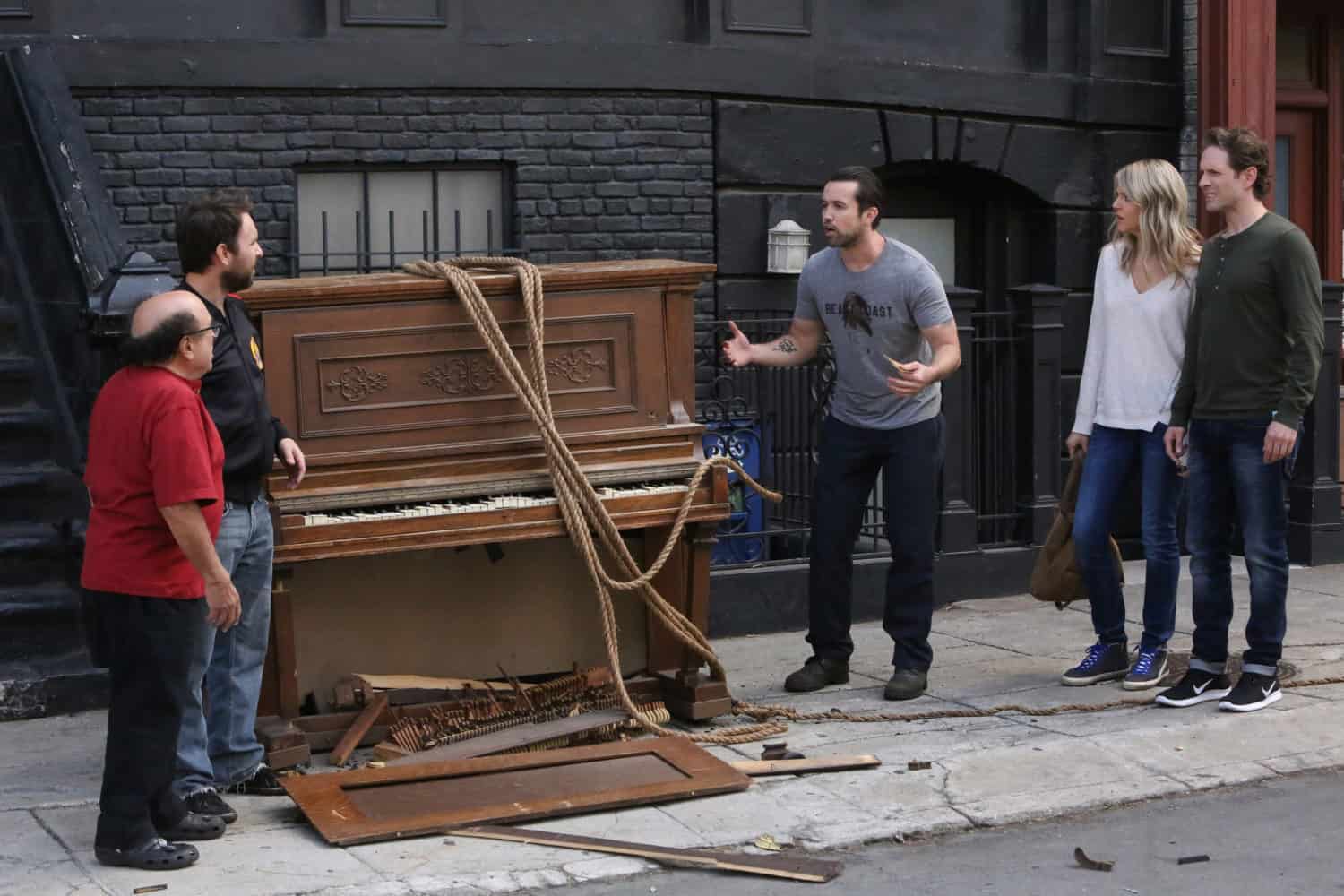
By · Published on July 11th, 2018
Information technology's Always Sunny in Philadelphiais a beautiful prove about horrible people. As much as we beloved the gang, it's difficult to actually like them. And while for the first few seasons they could all-time be described as jerks or misfits, over the years they've morphed into full-on sociopaths who lie, cheat, steal, and very possibly kill without a 2d idea.
But as the characters take gotten undeniably worse, the artistic minds behind them accept grown much more conscientious.
This is the key, probably, to the prove's longevity. Because Ever Sunny has been on for twelve seasons. And it's already been renewed for two more, setting it on course to necktie (and then, if there is a God, beat) the record for longest-running live-action comedy serial ever.
And when you've been on the air since 2005, you lot accept to make some changes. The political climate today is not what information technology was 13 years agone, and the jokes audiences are prepared to laugh at are non the same. That being said, Always Sunny has forever danced forth the line of what audiences are willing to take, especially on cable television receiver. With lilliputian in the way of censorship and a lot of elbowroom in the name of satire, the bear witness exists right at, or sometimes simply over, the line of what information technology's okay to express joy at.
This, combined with its sheer age, makes it a veritable timeline of the evolving political landscape of the last decade and a one-half.
This is best examined in terms of the exemplary flavour 12 episode "Hero Or Hate Crime?" which aired in 2017. In it, Mac is nearly crushed to expiry by a falling piano, and he's but saved when Frank gets his attention past yelling "expect out faggot." Frank saves his life, but his methods are seriously called into question.
The title is a callback to a season one joke, in which Mac accidentally punches a trans woman in the face. When two onlookers threaten to beat him up for hitting a woman, he explains that "Information technology'south a dude. She has a penis, so it's okay." The onlookers enquire each other if this is a hate criminal offence, decide that it is, and then hunt Mac to trounce him in earnest.
Twelve years subsequently, the joke is back, simply it'southward been reworked into a serious (though still deeply funny) meditation on the power of language. And fittingly, Mac, the original perpetrator, is the victim at present.
Because subsequently twelve years, Mac's finally officially gay. Was Mac always meant to be gay? Most shows don't kickoff with a 12+ year long arc in mind, and then maybe non. Merely even if inadvertently, his story has become a very reliable way to nautical chart America's perception of and conversation surrounding homosexuality.
Mac's sexuality was a fuzzy area from the beginning. Carmen, the trans woman he hits in the confront, is older than the show itself, appearing in the unaired pilot as Mac's love interest. Her plot is expanded in the season 1 episode "Charlie Has Cancer," where she exists generally as a visual punchline, a beautiful woman with a burl in her tight jeans. Information technology is not an episode that would fly now
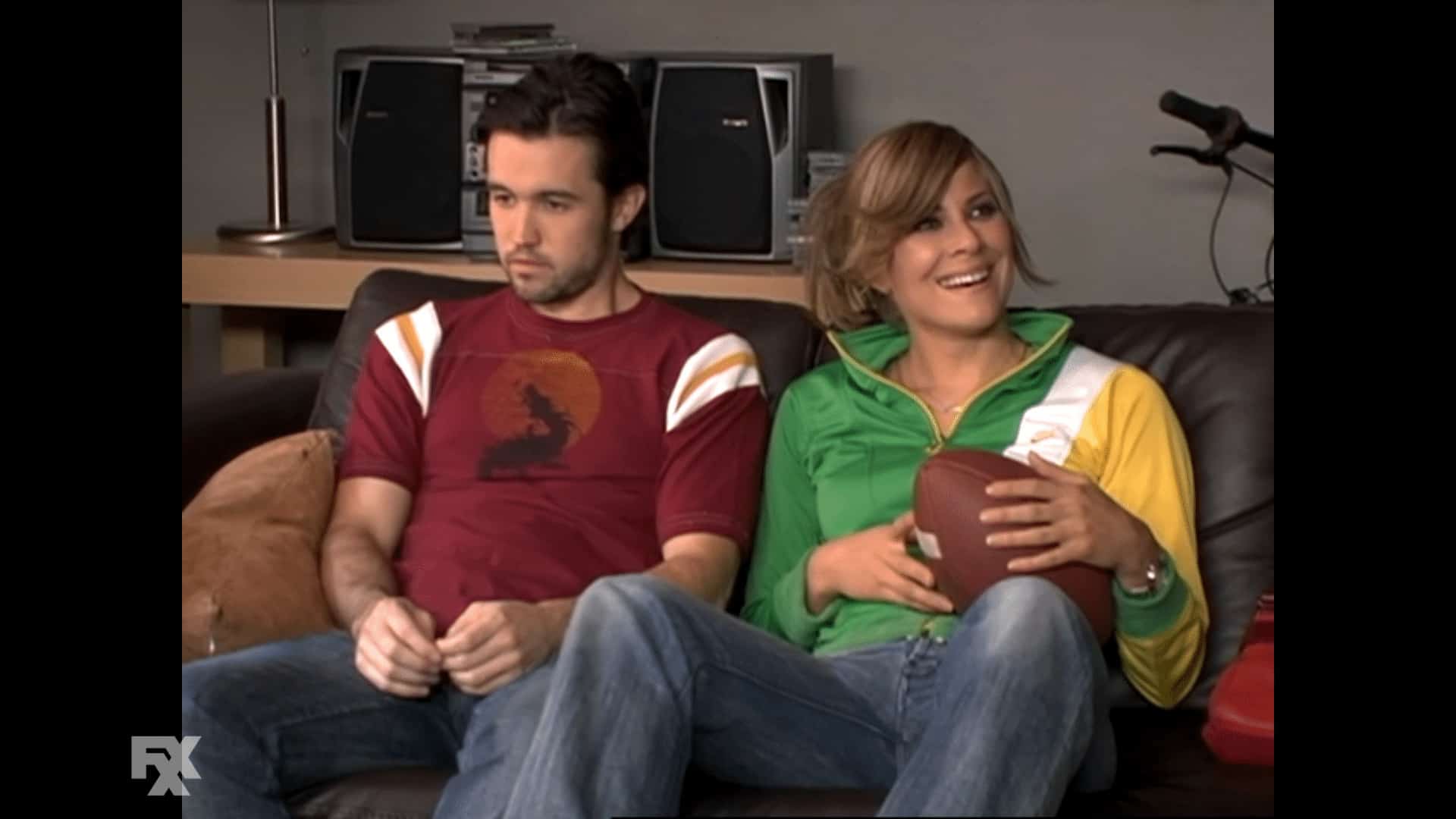
But fifty-fifty in these early on days, the attitude of the creators is plain at odds with that of the characters. (The episode is in fact written by Rob McElhenney, who plays Mac). Because fifty-fifty in that get-go episode, Carmen is practical and extremely comfortable with herself. She might be the most well-adjusted person in a whole season of misfits.
Then while the gang treats her horribly — Mac is ashamed and his friends are disgusted — Carmen really holds her own. And when she returns in the third flavor for "Mac is a Series Killer," she seems to have earned even more of the show's respect. In a happy but hole-and-corner relationship with Mac, she finally puts her foot down and kicks him out when he admits that he'southward aback of himself for sleeping with her. Mac, meanwhile, is so ashamed that his friends fault his sneaky actions for those of a murderer. They're all the same disgusted when the truth comes out, but the stance behind the writing seems crystal articulate — the gang are the ones at fault here.
The fact remains, however, that the episode culminates in four people berating their friend for sleeping with a pre-op trans adult female, and it's played for laughs. Three years later, in the flavour half-dozen premiere "Mac Fights Gay Marriage," the show is no longer joking effectually. Carmen has had her surgery and is happily married to a man, launching Mac on a blind crusade against both homosexuality and introspection. If in that location were any doubt, information technology'south very obvious by this indicate that Carmen is the normal one, and that Mac has some serious faith-induced repression.
Most notable in flavor 6 is the rest of the gang's obvious attitude shift. They utilise Carmen'due south right pronouns, and they congratulate her on her wedding. They're all in favor of matrimony equality (still five years before the Supreme Court ruling). The only one who takes some communicable upwards is Frank, ever the user-friendly vox of outmoded thinking. Just fifty-fifty he somewhen comes around, then much so that he enters a domestic partnership with Charlie. His rationale is nigh every bit expert as he's going to get: "Two dudes gettin' married — that doesn't seem very gay."
In other words, by 2010 transphobia and homophobia are no longer funny, fifty-fifty coming from people as horrible as the gang.
Instead, all of their negative attitudes are funneled into Mac, who himself becomes more and more overtly gay. From a full general interest in "beefcakes" all the style to coming back from a gay bar covered in glitter and "not answering any questions," Mac spends the better part of a decade in a cupboard with no door. He fifty-fifty comes out during a cursory crunch of faith in season 11, merely to have it all back when he decides God is real after all. Because that's something the show has been firm about for years — Mac won't come out because he thinks of himself every bit a tough Catholic, and tough Catholics aren't gay. While Mac may be the butt of many a gay joke, he's ever the one making them, and the real joke is on the society that's fabricated him deny himself — 1 of toxic masculinity and religious rigidity.
Meanwhile, the gang'south treatment of Mac's sexuality turns from cloy into bemusement, then exasperation, then finally furious support, when in "Hero Or Hate Crime?" they coax him out of the closet for skilful.
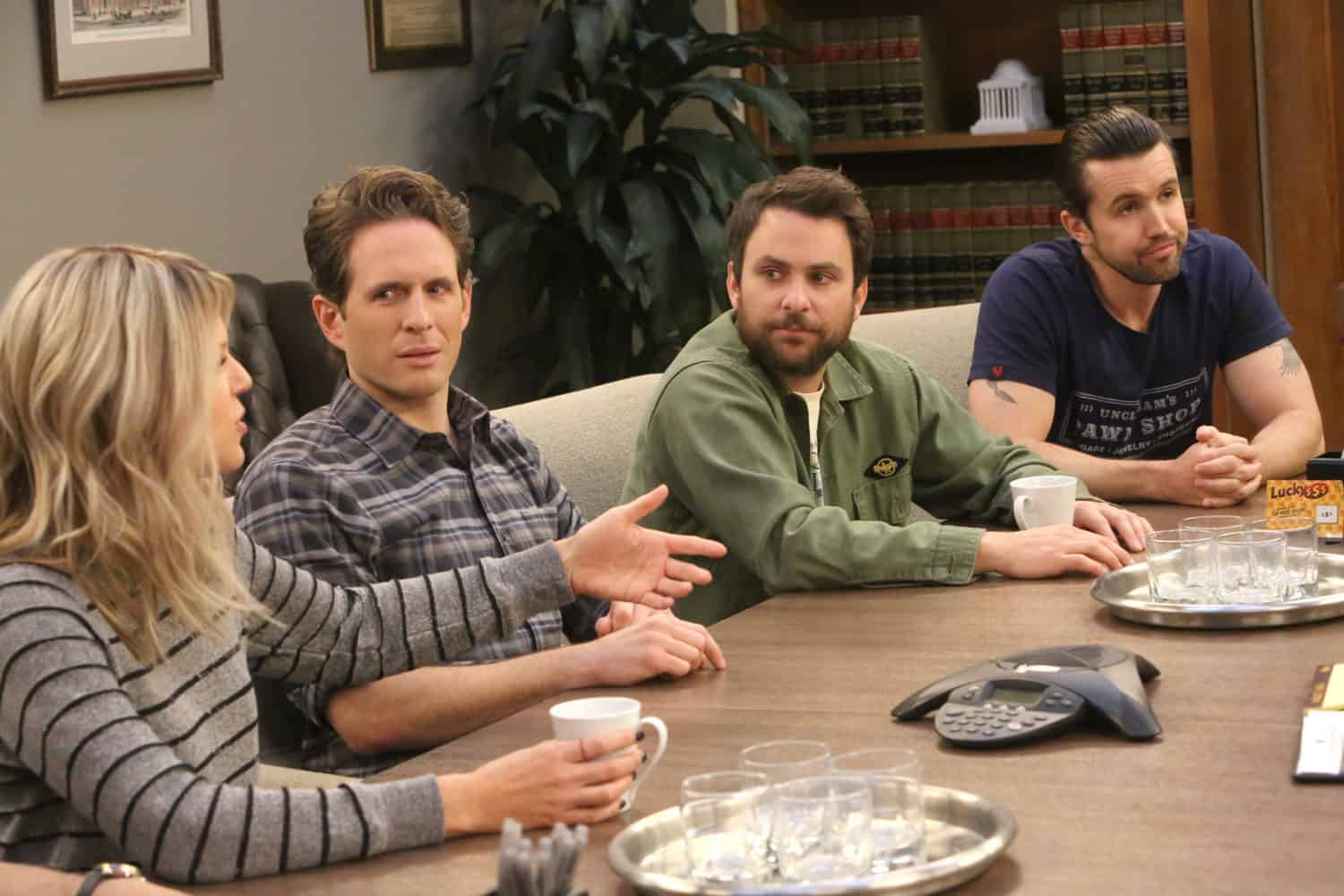
On the surface, the episode is a classic example of Always Sunny over-complication. The gang hires an arbitration lawyer to determine not whether a hate crime has been committed, but who is the rightful owner of a $2 scratcher ticket. Information technology's also a rare and hard-won instance of genuine heart equally Mac, after years of in-the-closet jokes, sincerely comes out to his friends.
But on top of that, and probably most importantly, it'south a frank and uncompromising examination of language.
Aired during its usual cable slot gloriously uncensored (Rob McElhenney says it was worth every penny in FCC fines), the episode begins with one advisedly placed "faggot" and and then works its mode through the pantheon of obscenity from at that place. The audience is treated to several "fucks," "cunts," and "cocksuckers," and a single very blatant N-word.
This brings us to the bear witness's fraught treatment of race over the years. Because if at that place'southward one thing the gang has been consistent about, it'due south casual racism.
Just like the title of "Hero or Hate Law-breaking?," the episode's one N-bomb is a callback to the bear witness's first season and, well-nigh probable, a deliberate demonstration of how far it's come up. In the evidence's very first episode (aptly called "The Gang Gets Racist"), Charlie says the N-word. With a very hard r. He doesn't mean anything past it, he tries to explicate, and he'due south but quoting a black acquaintance who said information technology starting time.
Simply the word's prominence in the script (in 2005 information technology's a funny misunderstanding as Charlie is "mistaken" for being racist) and its reception (Mac and Dennis don't bat an eye when they hear information technology) are strikingly dissimilar in 2017. Because when Charlie says it again, with an equally hard r, all hell breaks loose. Even the gang, in all their awfulness, have an overwhelmingly negative reaction.
The episode acknowledges its roots then disavows them. It accepts that fifty-fifty for people this bad, some things should probably be off the table these days.
It's an interesting line to walk in a satire — the line between what the characters are willing to do and what the writers are comfortable having them do. And governing it all, in the end, is what the audience is going to proceed watching. Always Sunny has done blackface not once simply twice, but in both cases information technology'southward explicitly a dubious decision made by the characters, and one that doesn't even sit well with all of the gang.
It'due south fitting that the commencement episode in question (in which Mac insists on looking a little too much like Danny Glover when they filmLethal Weapon five) is called "Dee Reynolds: Shaping America's Youth." After a field trip to a screening of the gang's movie, the just youth who'south been shaped at all is a student who shows up to school the next day in blackface. Both Dee and Charlie lose their jobs over it — a rare case of existent-world consequence for their actions. It turns out the gang's stilted logic does not use outside the bar.
Dee and Mac don greasepaint again for season nine's "The Gang Makes Lethal Weapon vi," and it'south even more jarring. But again, their attempts to get the moving picture financed fail miserably when no real person will get anywhere near it. Past flavour 11, even the gang distance themselves from it. In "Dee Made a Smut Film," Dee shows Dennis an acting reel of all her appearances on film over the years… with one conspicuous exception. "Information technology's missing something, isn't it?" Dee asks. "Nah, information technology's great." Dennis insists. It'due south a rare meta-moment of the gang expressing the writers' opinion that some things probably shouldn't be brought up again.E'er Sunny has almost definitely put its blackface days behind information technology.
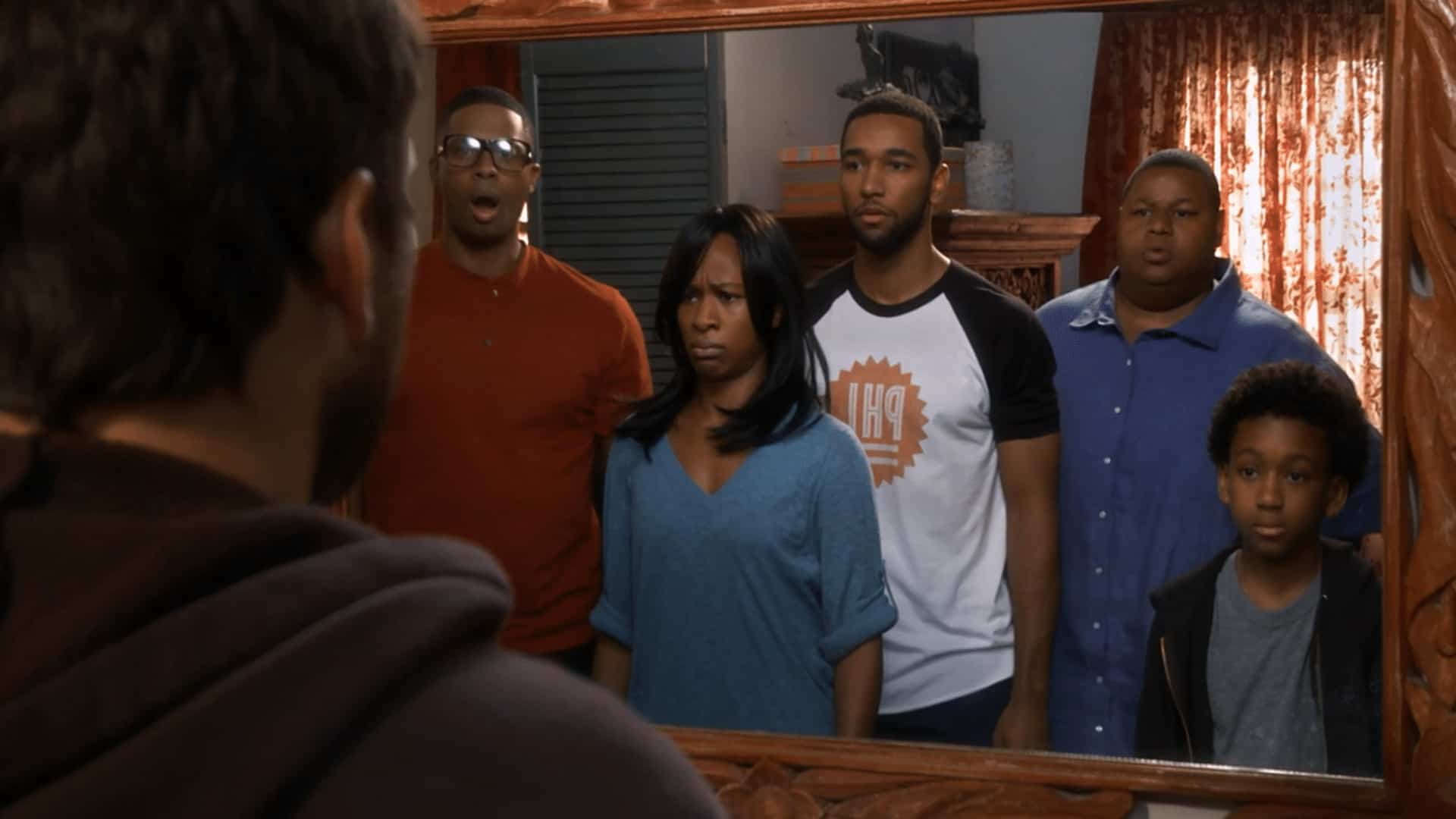
And it notably passes upwards the opportunity in season 12, with the extremely aggressive premiere "The Gang Turns Black." At once an indictment of racism in America and a total-fledged musical, it opens with the gang watching The Wiz and batting around every casually racist argument under the sun. It'south a bold get-go, only ane that's plain a commentary on the kind of people they are even afterward all these years. Just like a lot of Americans, they've grown to exist supportive of their gay friend merely they still have a matter or ii to say well-nigh Blackness Lives Affair.
Of course, this isn't the episode's real agenda. Following a freak electrical blanket blow, the gang is transported into the bodies of five African Americans. For one time, however, the visual humor is almost nonexistent — we and the gang still see their normal bodies. It's only in the rare instance that they look into a mirror or we see another graphic symbol'due south perspective that we're reminded of the change. Instead, almost of the comedy comes from the bonkers fact that they'realso trapped inside a musical and singing against their will. After the sheer spectacle of seeing Mac and Dee in greasepaint in earlier seasons, it'due south articulate that our attention is being dramatically directed elsewhere, and something deeper is going on.
And it is. There'due south a lot of uncomfortable humor to be found in the gang's desperate grappling with their own racism. Determined to learn a lesson and appease the Freaky Friday-esque powers that be, they attempt and fail again and again to understand what it ways to be black in America. And considering they're bad people, they manage to vocalize some pretty bad lessons along the way… That is until Charlie, in the body of a small child, is gunned downward by the police when his toy railroad train is mistaken for a gun. The gang declare that they've learned their lesson and desire to go home.
It's a hell of an prototype, and one that can't really be misinterpreted.
In the end, information technology'due south revealed that the entire episode has been the dream of Sometime Black Human, the poor homeless guy who'south been sharing a bed with Dee, Dennis, and Mac since they lost a bet in season 11. Information technology turns out the non-dream gang didn't learn a damn matter virtually racism, and we're left with them evicting Sometime Black Homo (whose real name, we've learned, is Carl) out into the street.
More than ever before, the show is determined to distance itself from its characters. The gang may be racist every bit hell, merely the writers desire the states to know that they aren't.
This brings u.s. to a final perennial effect: sexual consent. "The Nightman Cometh," 1 of the show's well-nigh beloved episodes, is clearly well-nigh Charlie being molested equally a child. And his never-catastrophe beloved affair with The Waitress is one of unwanted advances and obsessive stalking that slowly ruin her life. Merely a lot like the gay jokes, the rape jokes have noticeably changed over the years.
In fact season 11's surreal "The Gang Hits the Slopes," in which the gang find themselves in a parody of the 1990 film Ski School and other sexual activity comedies of the time, forcefully distances the evidence from its by flippancy. Partying with a perfectly sad and aging Dean Cameron, Dee and Mac are horrified by his outdated (but old mainstream) confusion betwixt "pranks" and sexual assault. Charlie expresses the disparity very well: "Where I come from, jamming your dick through a hole in the wall, that's assail. That's a felony. And it'due south simply patently incorrect."
Of class, Paddy'southward Pub has had a glory hole in its bathroom since flavor four. But times take changed, both since 1990 and 2009, and fifty-fifty the gang admit it'due south for the best. In the end, Cameron's character is arrested for committing "a litany of sexual assaults." Equally he's beaten by the constabulary, Dee and Mac concord that he probably deserves information technology.
That'southward not to say the rape jokes are gone. But the style they're delivered has changed. Just like the show's homophobia has been gradually concentrated into Mac, its sexual deviancy has been channeled virtually entirely into Dennis.
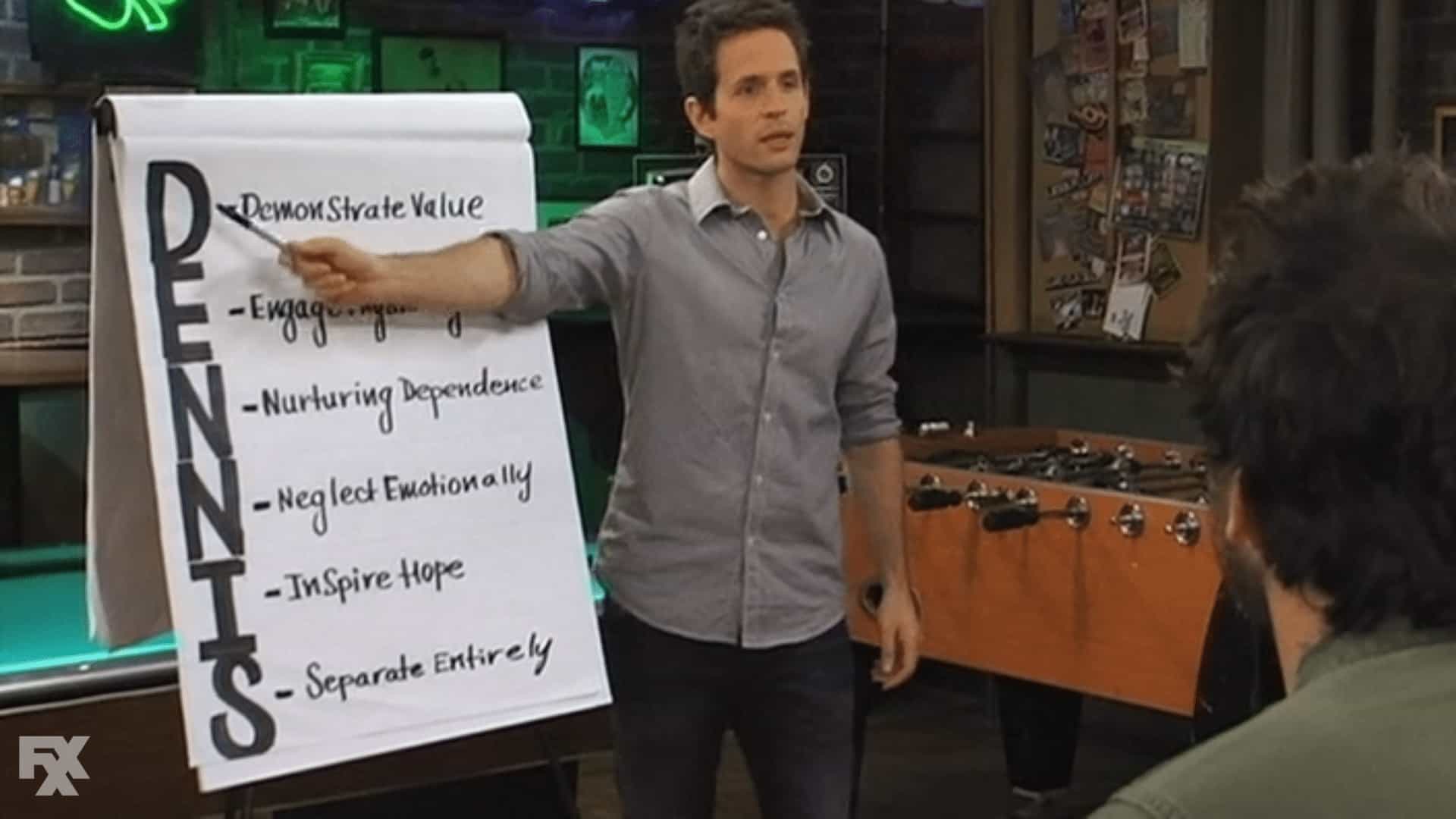
For a long time, Dennis has had highly questionable attitudes about women. His antics have spawned some of the show'due south nigh memorable elements (the D.E.N.Due north.I.S organisation, the "implication"), and take as well led many fans to deduce that he's a serial killer. Because like Mac's sexuality, Dennis' creepiness has only gotten more and more explicit and outrageous over the years. Dennis hasn't had feelings since he was fourteen, he keeps duct record, zip ties, and gloves in his automobile in example someone has to "pay the ultimate toll," and his go-to symbol of love is a woman's head in a freezer. Dennis is, almost definitely, a murderer and a rapist.
Unless he's not. Because season 12 has shown Dennis every bit he'southward never been seen before: as a human being.
In "The Gang Goes to a Water Park" Dennis bonds with a young daughter he sees himself in, and he experiences what might be his starting time-ever relationship non tinged by sexuality or power. In "The Gang Tends Bar" he reveals, in a startlingly real moment, that he does actually take feelings — feelings nosotros come across in full force when Mac surprises him with a Valentine's Day gift. (Granted, the gift is a rocket launcher, only that'due south just the correct amount of trigger-happy weirdness to make the moment however feel truthful to Dennis).
And of course the season 12 finale delivers the ultimate bombshell — afterwards a heartfelt embrace with the son we never knew he had, Dennis decides to leave his old life behind and "be a dad." The divergence, according to the creators, may exist for good.
Does this accept anything to exercise with the current climate effectually sexual set on? Information technology's unclear, but a lot of things surrounding Dennis' difference are being left unclear for now. However, in an interview with The Daily Beast, Glenn Howerton, who plays Dennis, said "I do think that information technology's time for that character to change. I recall he has to change. It was never actually adequate the way he behaved, and at present it's even less then in terms of how you actually can't get abroad with it anymore."
Granted, Howerton too has a new show on a unlike network. And subsequently 12 years of devotion, it'south reasonable for an actor and author to want to exercise something else with his life. But Dennis' emergence of unprecedented humanity and his sudden realization that he can't stand his old life anymore advise that the show knows it can't keep him like he'southward been and stay relevant.
Howerton's departure, whatever the cause, and whether it'southward forever, brings upwards a valid point — it'due south a tall order, in 2018, to write and perform a character who is a series rapist… in a funny way.
Whatsoever it chooses to tackle in its next two (at to the lowest degree) seasons,It's Always Sunny in Philadelphiais probable to exercise information technology well. It'south stood the exam of time confronting all odds, and its willingness to arrange fifty-fifty while edging the line of acceptability has earned it a dear identify in our hearts, and in America's agreement of itself over the past decade and a one-half.
Here's to 12 more years. I sincerely hope information technology'due south with Glenn Howerton back on board.
Related Topics: Comedy, Culture, it's always sunny in philadelphia, Politics

Liz Baessler is a frequent contributor and infrequent columnist at Film Schoolhouse Rejects. She has an MA in English language and a lot of time on her hands. (She/Her)
Recommended Reading
'Gaslight' and the Political Psychology of a Melodramatic Thriller
'Gaslight' may accept been political to begin with, but the term it spawned has still become overused for political discourse.'A Series Of Unfortunate Events' is 2019'south Surprise Guide to Fighting Corruption
Oppression, incompetence, and intolerance are familiar foes in the series' timely concluding flavourMurphy Brown & The Last Anti-Heroine
One viewer's 'Tater Brown' is another viewer's 'Roseanne.'How 'Blindspotting' Makes the Personal Political
The truth as entertainment and commentary.Source: https://filmschoolrejects.com/progressiveness-its-always-sunny-in-philadelphia/